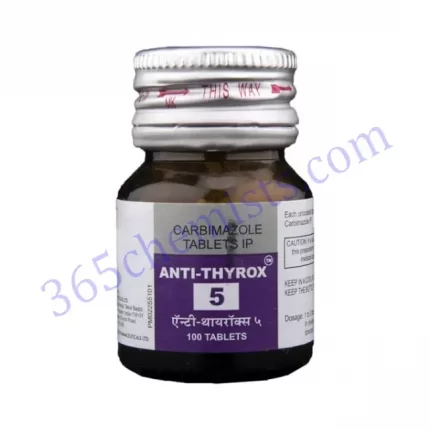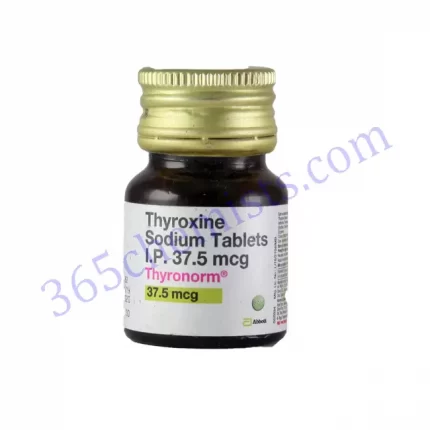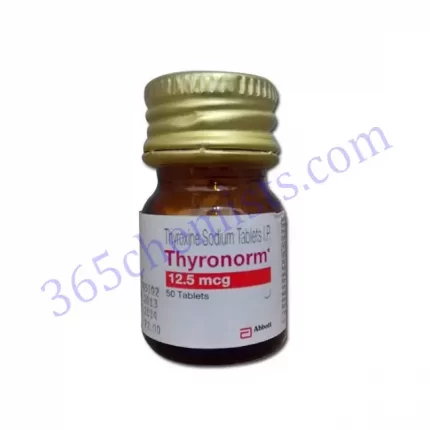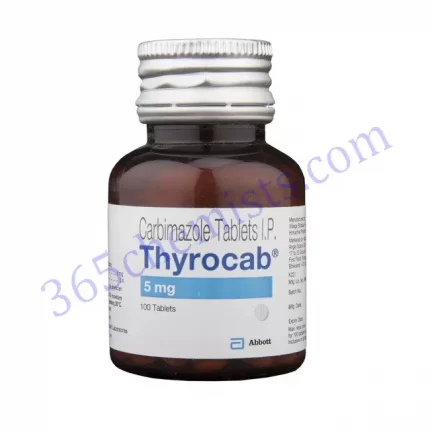Anti-Thyrox 10mg Tablet (Carbimazole 10mg)
Carbimazole is the active component of the pharmaceutical known as Anti-Thyrox 10mg Tablet. This medication is taken by mouth. The most common application for this medication is for the treatment of hyperthyroidism, which is a condition in which the thyroid gland produces an abnormally high amount of thyroid hormones. Carbimazole achieves its therapeutic effect by inhibiting the production of thyroid hormones, which enables it to contribute to the body’s effort to maintain normal levels of these hormones.
Uses of Anti-Thyrox 10mg Tablet:
The management of hyperthyroidism, including conditions such as Graves disease and toxic multinodular goitre, requires the use of Anti-Thyrox 10mg Tablet. This medication is prescribed to patients. It is helpful in bringing under control the symptoms of hyperthyroidism, which can include tremors, rapid heartbeat, weight loss, and sweating. The goal is to restore normal thyroid function, and one way to do this is by lowering the production of thyroid hormones.
Dosage and Administration:
It is possible for the recommended dosage of Anti-Thyrox 10mg Tablet to change depending not only on the severity of the hyperthyroidism but also on the patient’s age, weight, and general state of health. It is essential to ensure that the dosage and administration instructions provided by your healthcare provider are strictly adhered to at all times. To reduce the risk of experiencing adverse effects on the gastrointestinal tract, the tablet should be swallowed whole, preferably while eating.
According to the instructions provided by your physician, the recommended dosage for Anti-Thyrox 10mg Tablet is to take one tablet on a daily basis, either once or twice. Your healthcare provider will evaluate your unique requirements in order to determine the appropriate dosage, as well as the length of time you will need to undergo treatment. It is essential to take the medication on a regular basis and at the same time each day in order to keep the concentration of the drug constant in the body.
During treatment with Anti-Thyrox 10mg Tablet, it is imperative to undergo routine monitoring of both the levels of thyroid hormone and the clinical symptoms. Your primary care physician or other healthcare provider will decide how frequently you should return for follow-up visits and have laboratory tests performed in order to evaluate how well the medication is working for you.
Side Effects of Anti-Thyrox 10mg Tablet:
Anti-Thyrox 10mg Tablet, like any other medication, carries with it the potential to cause certain adverse effects in some people. Nausea, vomiting, appetite loss, headaches, and skin rashes are typical adverse reactions that can occur when taking this medication. These unwanted effects are typically mild and short-lived, and they go away once your body becomes accustomed to the medication. However, you should talk to your doctor if any of these side effects continue or get worse after taking the medication they were prescribed for you.
Anti-Thyrox 10mg Tablet may, in extremely unusual circumstances, cause more serious adverse effects, such as dysfunction of the liver or blood disorders. Jaundice, which is a yellowing of the skin or the eyes, dark urine, pale stools, persistent nausea, and abdominal pain are all indicators that there may be a problem with the liver. Blood disorders can manifest themselves in a variety of ways, including unexplained bruising or bleeding, a sore throat, or a persistent fever. Seek immediate medical attention if you experience any of these serious adverse effects from the medication.
Precautions and Warnings:
Before beginning treatment with Anti-Thyrox 10mg Tablet, it is important to discuss any preexisting medical conditions, allergies, or medications that you are already taking with your healthcare provider. Because carbimazole has the potential to affect liver disease as well as blood disorders, it is essential that any relevant medical history be disclosed.
There is a possibility of an interaction between Anti-Thyrox 10mg Tablet and other medications, including beta-blockers and anticoagulants, amongst others. For this reason, it is absolutely necessary to inform your doctor about all of the medications that you are currently taking in order to prevent the possibility of adverse drug reactions.
Anti-Thyrox 10mg Tablet should be used with extreme caution by women who are pregnant or breastfeeding because the safety of this medication during pregnancy and lactation has not been thoroughly researched. Before prescribing this medication to you, your healthcare provider will carefully consider both the benefits and the risks associated with it.
Conclusion:
One of the medications that is utilised in the treatment of hyperthyroidism is known as Anti-Thyrox 10mg Tablet. The active component of this product is known as carbimazole, and it plays a role in the regulation of the production of thyroid hormones. Your healthcare provider should be followed in terms of the dosage and the way the medication should be administered. Anti-Thyrox 10mg Tablet may cause side effects, including disturbances to the gastrointestinal tract and dysfunction in the liver, despite the fact that it is generally well tolerated. Individuals who are suffering from liver disease or other blood disorders need to take extra precautions. Before using this medication, women who are pregnant or breastfeeding should talk to their doctor or other healthcare professional.












